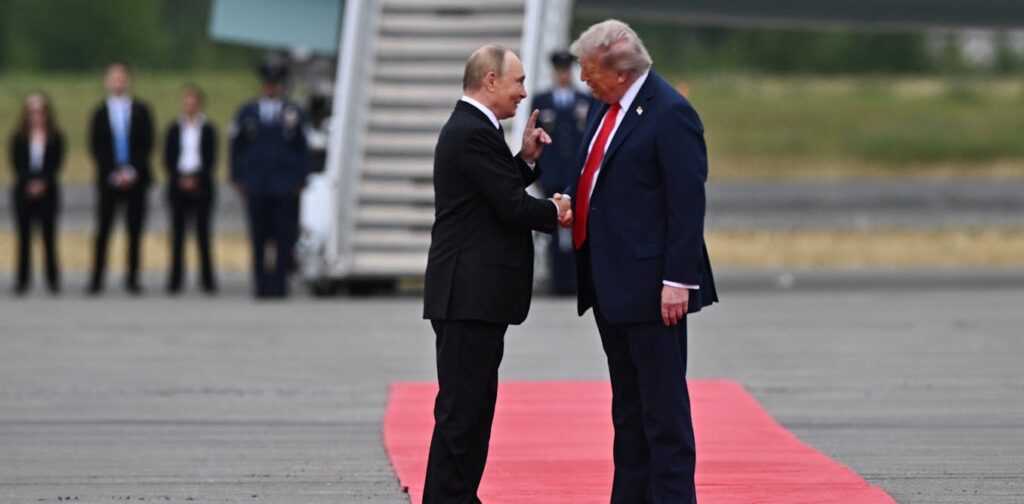The extremely anticipated assembly between U.S. President Donald Trump and Russian President Vladimir Putin in Alaska ended with out a breakthrough on Ukraine, nevertheless it supplied Moscow a symbolic victory and left Western allies questioning Washington’s diplomatic technique.
The summit was marked by theatrical thrives extra harking back to a state pageant than hard-nosed diplomacy. A crimson carpet welcome, navy flyovers, and tightly choreographed photograph alternatives set the stage for what Trump later described as “a optimistic step” in U.S.-Russia relations. But behind the spectacle, no concrete progress was made towards ending the warfare in Ukraine, now effectively into its third 12 months.
Observers famous that the occasion appeared designed as a lot for optics as for substance. Putin delivered a prolonged, polished handle on the joint press convention, whereas Trump supplied a shorter, improvised response. The distinction underscored a summit that appeared to raise Russia’s place with out extracting significant concessions.
For Putin, the end result was arguably higher than anticipated. Trump dropped his earlier insistence on a right away ceasefire in Ukraine, and speak of recent sanctions towards Moscow has all however evaporated. As a substitute, the Russian chief emerged with renewed legitimacy on the worldwide stage, not as remoted as Western governments had sought to maintain him.
Putin used the platform to border Russia as an awesome energy with equal footing to america. He proposed expanded financial cooperation in areas starting from digital expertise and vitality to area exploration, whereas dangling the prospect of renewed nuclear arms talks. For Moscow, these overtures bolstered the picture of a resurgent superpower able to shaping the worldwide agenda.
In Europe, the summit has been greeted with unease. For years, European leaders have warned towards conceding to Russia’s territorial ambitions, arguing that any lodging dangers emboldening the Kremlin. Trump’s willingness to entertain the potential for territorial concessions in Ukraine raised alarm that Washington might weaken the collective Western stance that has underpinned assist for Kyiv because the warfare started.
Diplomats privately expressed concern that the Alaska summit amounted to rehabilitation of Putin on the world stage. By treating Russia as an equal associate with out clear preconditions, the U.S. president successfully rolled again years of coordinated Western efforts to isolate Moscow diplomatically.
Trump’s strategy recalled his earlier conferences with North Korean chief Kim Jong-un, the place elaborate staging produced world headlines however no lasting agreements. In each circumstances, the previous actuality tv star appeared to prioritize optics and private showmanship over substantive negotiation.
Throughout a Fox Information interview after the Alaska assembly, Trump defended his technique, declaring: “It’s good when two huge powers get alongside, particularly once they have nuclear energy. We’re primary and quantity two on the earth.” His remarks, nonetheless, drew criticism for overstating Russia’s function whereas minimizing the affect of America’s European allies.
For Ukraine, the implications are troubling. With out U.S. stress, the prospect of a negotiated ceasefire seems extra distant. Analysts warn that Russia has gained beneficial time on the battlefield by persuading Washington to ease its calls for. By presenting negotiations as ongoing, Moscow can consolidate positive factors whereas deflecting requires accountability.
Trump, in the meantime, forged Ukraine as an impediment to peace, reviving his long-standing declare that the warfare would by no means have erupted had he been president earlier. Critics argue that such rhetoric dangers framing Ukraine not as a sufferer of aggression however as a stumbling block to U.S.-Russia reconciliation.
The Alaska summit highlighted the perils of high-stakes diplomacy performed with out agency preparation or clear goals. Whereas it prevented quick escalation, it left the basic points unresolved and arguably shifted leverage towards Moscow.
The one potential silver lining might lie in Europe’s response. With Washington’s place now unsure, European governments might really feel compelled to take a extra assertive function in supporting Ukraine and shaping coverage towards Russia. As one senior diplomat put it: “If nothing else, this summit has reminded us that Europe can’t outsource its safety fully to america.”
For now, Putin leaves Alaska with renewed visibility, Trump claims a diplomatic success, and Ukraine stays on the battlefield — its destiny as soon as once more caught between symbolism and onerous actuality.


